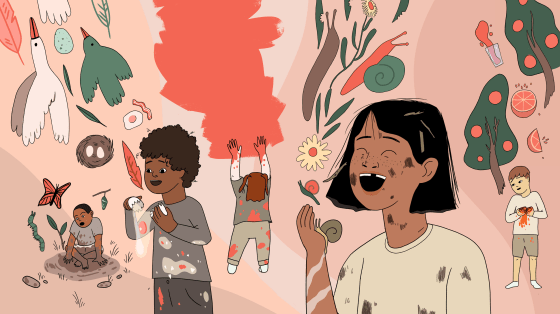In 2015, Pope Francis told a crowd of young people in Paraguay to go out into the world and “make a mess.” There is some dispute about whether he was speaking spiritually or literally. I think the fairest reading is that it was both. “Make a mess, but then also help to tidy it up. A mess which gives us a free heart, a mess which gives us solidarity, a mess which gives us hope,” Francis said to a cheering crowd.
Our aversion to messy kids is having some really nasty effects on our children, and on us.
In one way, you can understand why the South American Catholic kids cheered. It’s not every day that the living head of your church, and the first pope from your continent, all but tells you to go have a food fight so long as you help clean up after. As he noted in his remarks, “They wrote a speech for me to give you. But speeches are boring.”
It would be good if the pope would say similar words the next time he comes to the United States, because it’s a message parents here of all faiths, or no faith at all, really need to hear: Messy kids are OK.
Kids in America used to be allowed and even encouraged to get dirty and do things on their own. Especially during summers, kids were told to go out and play and be back by dinner. That is not the case in the country these days, and it's more than a shame. The Covid-19 pandemic makes this complaint more urgent, not because we shouldn’t take any precautions, but because outdoor transmission of the virus is so low, and thus outdoor activities should be greatly encouraged.
Quite apart from Covid, our aversion to messy kids is having some really nasty effects on our children, and on us. Neighbors call the police when they see kids are unsupervised and doing dangerous things such as walking the dog, walking together to and from the park or being left waiting in locked, air conditioned cars for a few minutes.
You might think this expectation of parental surveillance would be relaxed within one’s own home, but no. According to a paper presented at the American Academy of Pediatrics’ annual conference in 2019, “A majority of social workers surveyed believe children should be at least 12 before being left home alone four hours or longer.” To which an editor I know retorted, “I was babysitting at 11.” Let’s hope the pandemic gives experts second thoughts on this terrible guidance.
As one might expect in this repressive social environment, many neighborhood parks have been practically empty of spontaneous activity by children. You might think Covid would get them back out there, but the results have been pretty mixed. For a time, many parks even had sections closed off because of the pandemic. So instead, many kids stay home and play video games or, when lockdowns are not in effect, they go out for sports and other activities that are organized and chaperoned by their parents. These activities tend to be weighted toward looking good on one’s college applications.
Growing up like this, many kids fail to make a meaningful connection with the natural world. There are programs that try to make up for this nature deficit, and they do some good for our scrutinized and isolated children. But they are almost invariably structured by adults and are poor substitutes for kids just getting out there and experiencing things for themselves.
Too many American kids grow up in almost sterile environments, and Covid is likely to only make things worse. While there is of course nothing wrong with regular hand-washing, especially during a pandemic, parents fret about folks washing their hands or using hand sanitizers before they are allowed to handle babies. Bottles and nipples are assiduously sterilized. Kids are taught in myriad ways that being messy and disorganized is bad, and this message helps form their preferences throughout their lives.
This state of affairs seems very wrong to me, a relatively new parent, and very wrong for our kids.Take the rise of widespread allergies and autoimmune disorders. Though the evidence is not conclusive, it seems likely that our aversion to messiness is making things worse. The theory: By imposing a very sterile world on them, we’re depriving their immune systems of normal exterior threats, so many of those systems are badly malfunctioning.
Our aversion to messes could also be stunting childrens’ intellectual growth. Larissa Samuelson, then an associate professor of psychology at the University of Iowa, led a team of researchers who studied how well 16-month-old children could learn words for mushy substances “from oatmeal to glue,” Iowa Now wrote in 2013. Those who excelled did so because they were strapped into a highchair and introduced to the substances. The highchair is the one place where some amount of mess is still tolerated by many parents, and is thus a place of great freedom.
“It may look like your child is playing in the high chair, throwing things on the ground, and they may be doing that, but they are getting information,” Samuelson told Iowa Now. “Playing with these foods there actually helped these children in the lab, and they learned the names better.”
In other words, they learned by making a mess. That’s how a lot of learning happens. We ought to be encouraging more of this “mess that gives us a free heart,” not scolding it to death.


